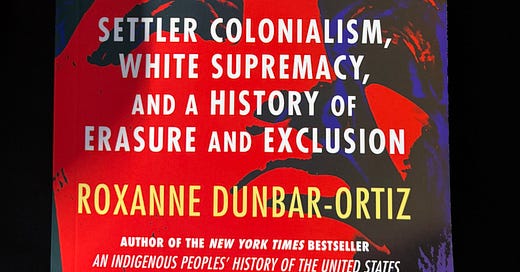Book Coven is a free virtual book club dedicated to empowering members through literature as a tool for both personal and collective liberation. learn more
Book Coven! We are ready for our next read- Not A Nation Of Immigrants by Roxanne Dunbar-Ortiz.
You can order it HERE
I also encourage you to check your local bookstores and visit your library—many libraries offer physical, digital, and audiobook copies. Additionally, check Libby, a free app that allows you to borrow e-books and audiobooks through your local library. Supporting independent bookstores and public libraries strengthens our communities and keeps knowledge accessible to all.
Register
Our Book Coven meeting will be on Thursday, July 31st, at 6 PM Eastern Time. This will be our review and discussion session for Not A Nation Of Immigrants.
Important: At the end of this guide, you’ll find calls to action aligned with this months book theme. It only takes a moment of your time, so be sure to check it out!
Register HERE.
If you need any support please reach me at support@iamjulietdiaz.com
Why Not A Nation Of Immigrants Is Important and Timely
• Deconstructs harmful myths: It directly challenges the romanticized, feel-good story of America as a welcoming land of immigrants —a story that erases Indigenous genocide, slavery, and settler violence.
• Reframes American identity: In a time of rising nationalism, anti-immigrant sentiment, and backlash against racial justice movements, this book asks us to look deeper at the roots of injustice.
• Centers truth and accountability: Rather than calling for reform, it calls for reckoning —an honest confrontation with history as a path toward healing, repair, and resistance.
• Connects struggles: By weaving together Indigenous, Black, Latinx, and immigrant histories, it offers a framework for solidarity and collective liberation.
Reading Guide for Not A Nation Of Immigrants
By Roxanne Dunbar-Ortiz
About the Author
Roxanne Dunbar-Ortiz is a historian, author, professor, and long-time activist for Indigenous rights and social justice. She is perhaps best known for An Indigenous Peoples’ History of the United States, a landmark book that reframed American history from an Indigenous perspective. Born in Oklahoma to a working-class family with mixed settler and Indigenous heritage, Dunbar-Ortiz has spent decades critiquing U.S. imperialism, white supremacy, and settler colonialism in both academic and activist spaces.
About the Book
Not “A Nation of Immigrants” challenges the widely accepted narrative that the United States is a land built by and for immigrants. Roxanne Dunbar-Ortiz argues instead that the U.S. was founded on settler colonialism, Indigenous genocide, slavery, and white supremacy —not on inclusion and opportunity. This book reframes American history, asking us to reckon with foundational myths that erase violence and uphold systemic injustice.
She dives into how U.S. history has been sanitized —elevating stories of immigration while ignoring the country’s ongoing legacy of conquest. From Columbus to modern policy debates, Dunbar-Ortiz offers a rigorous, unflinching counter-narrative that centers truth over nationalism.
Suggested Reading Schedule
To stay on track for our June 30 meeting, here’s a weekly reading plan:
• Week 1 (July 1–7): Introduction + Chapters 1–2
• Week 2 (July 8–14): Chapters 3–4
• Week 3 (July 15–21): Chapters 5–6
• Week 4 (July 22–28): Chapters 7–Conclusion
• Week of July 29–31: Final reflections, notes, and prepare for the meeting
Reflection Prompts
Use these prompts to deepen your engagement with the text:
Week 1:
• What does the phrase “a nation of immigrants” mean to you? Has it shaped your understanding of U.S. history?
• What was most surprising or confronting in the early chapters?
Week 2:
• How does Dunbar-Ortiz describe settler colonialism as a structure rather than an event?
• What parallels do you see between historical and modern justifications for land theft and violence?
Week 3:
• What connections is she making between immigration policy, racism, and capitalism?
• How does the myth of American exceptionalism show up in your own education or upbringing?
Week 4:
• What are your takeaways about national identity and historical memory?
• How do we resist revisionist history while holding complexity and hope?
To continue the discussion in community, join the Book Coven Chat Group.
Discussion Questions For Group Meetings
For our meeting on July 31st, consider the following questions:
1. What did this book unearth or unsettle in you?
2. What myths or inherited beliefs did it challenge?
3. How did your understanding of “immigration” shift while reading this?
4. In what ways does the book ask us to change —not just what we know, but how we live?
5. What stories from your own background felt connected to or challenged by this book?
6. What’s one action or shift this book inspires you to take?
7. How might we hold space for accountability and grief while staying rooted in community and collective liberation?
Additional Resources
To enhance your understanding of the novel and its themes, explore these resources:
• YouTube: Roxanne Dunbar‑Ortiz at Harvard Book Store: A recorded talk on her book’s critique of the “nation of immigrants” narrative.
• Interview on KPFA’s “A History of Settler Colonialism” An in-depth discussion of history’s erasures and how they shape modern systems.
• The creation of the mythology of the US as ‘a nation of immigrants’ has a complex political history that can actually tell us a lot more about America than the myth itself.
Calls to action
1. Join us as we mobilize to protect our neighbors, our neighborhoods, and our rights. Send a message to Congress and the Department of Homeland Security. Tell them to immediately halt deportations and detention. Demand that they stop jailing families and separating loved ones. Urge them to respect the rights and dignity of all people!
2. Donate to Legal Support Funds
• RAICES – Provides legal aid and advocacy for immigrant families in the U.S.
3. How to Help Families Prepare for Immigration Raids and Other Enforcement Actions HERE
4. Distribute “Know Your Rights” cards and fliers in your community. Organize teams to get them into schools and workplaces. Host a training at your local community center, church, or union hall. Publicizing this information is an chance to get people together to strategize about how to accomplish the other tasks on this list.
5. Accompany immigrants in your community. Whether you’re an immigrant or an ally, you can support efforts to accompany immigrants as they go through court processes, check-ins with Immigration and Customs Enforcement, or to other appointments. If you’re in or near San Diego, California; Colorado; Miami, Florida; New Hampshire; New Jersey; or Oregon, you can connect with a local AFSC office. You can also look for other immigrant rights programs in your area and find more ways to volunteer your services.
6. Volunteer with Local Immigration Organizations
• Look for local nonprofits, mutual aid groups, or community workshops that support immigrants, asylum seekers, and refugees.
• Offer your time for translation, tutoring, know-your-rights sessions, or community integration.
BOOK COVEN
Welcome to Book Coven— Book Coven is a free virtual book club dedicated to empowering members through literature as a tool for both personal and collective liberation.
I’m so grateful you’re here. This is more than just a book club; it’s a Coven for those who believe in the power of literature to create change, heal, challenge, and transform. Whether you’re here to deepen your personal journey or to connect with a community dedicated to collective liberation, you are in the right place.
Rooted in Literary Activism At its core, Book Coven is about more than books—it’s about action. We believe literature has the power to spark change, and we are committed to using this space to amplify urgent causes, share calls to action, and keep each other informed. Together, we engage with stories that challenge systems, honor voices too often silenced, and imagine new possibilities for ourselves and our communities.
Join us
What You Can Expect
As part of the Book Coven community, you’ll receive:
• Monthly Reads – One book each month (with extended time for longer reads when needed).
• Curated Book Guides – Reflection prompts, discussion questions, reading schedules, and deeper resources to enrich your experience.
• A Private Chat Space – Ongoing conversations, insights, and support.
• Monthly Virtual Gatherings – Discussions where we come together to share thoughts, questions, and reflections.
• Guest Author Visits – Whenever possible, we invite the authors of our chosen books to join us for conversations.
• Polls to Help Shape Our Selections – You’ll get a say in what we read next.
• Event Announcements – Be the first to hear about upcoming virtual and in-person gatherings.
Note: You’ll receive the registration link for each virtual meeting directly in your monthly book guide.
Thank you for being part of this journey. I can’t wait to read, reflect, and grow alongside you.
With appreciation and solidarity,
Juliet Diaz (Founder of Book Coven)
By Juliet Diaz:
Juliet Diaz is an Indigenous Taino and first-generation Cuban American, as well as an award-winning and internationally bestselling author and literary activist. Her writing is rooted in liberatory and decolonial themes, empowering others to reclaim their voices, align with their truth, and embrace their innate magic and humanity.
As the founder of the Literary Craft Society, she leads a revolutionary writing community dedicated to fostering change, healing, and liberation through the transformative power of words.
Her works, including Witchery: Embrace the Witch Within, Plant Witchery, The Altar Within, the Seasons of the Witch Oracle Deck series, and the Earthcraft Oracle Deck, have inspired thousands across the world to create meaningful change within themselves and their communities.
I have my own newsletter:
A monthly community newsletter: The Altar Within—notes on life, magic, and liberation.
“Writing is a way of making sense of the world, of uncovering what’s hidden and reclaiming what’s ours. Here, I share reflections on life, the unseen forces that shape us, and the ongoing work of liberation—personal and collective. No fluff, no pretenses—just honest writing as a tool for deeper understanding and transformation.”







I’ll be out of town for the coven mtg but I’m going to get the book and read it anyway 🙌🏽❤️🪶